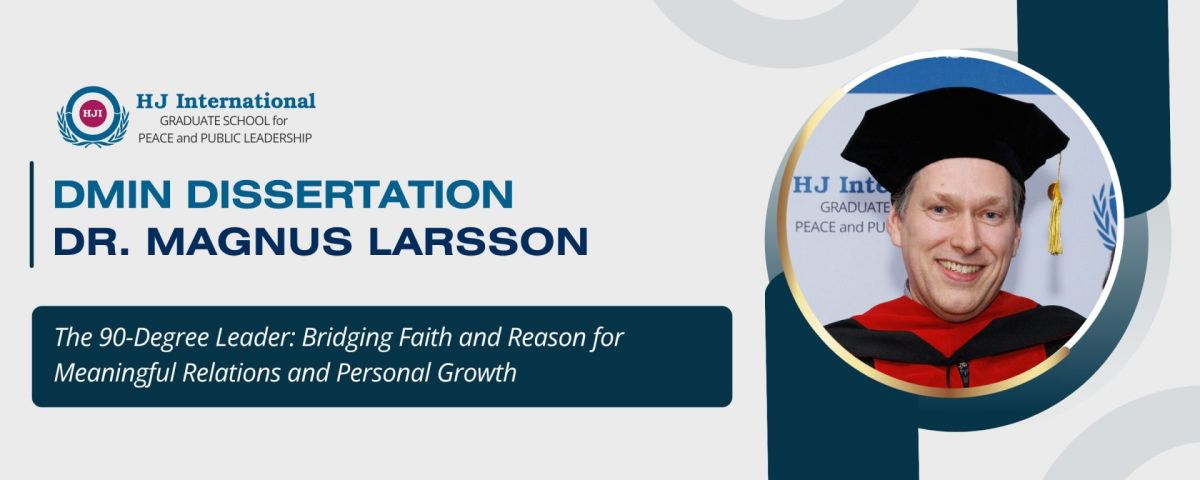The 90-Degree Leader: Bridging Faith and Reason for Meaningful Relations and Personal Growth

Doctoral Dissertation Project Summary by Magnus Larsson | Larssonusa@gmail.com
Abstract
How can religious ideas be presented to people who do not already have a background in faith? Is there a way to talk about God that does not alienate those who are skeptical of religious authority?
In today’s world, where many seek both intellectual credibility and personal meaning, education must bridge spiritual insight with real-world application. This requires a model that is both theologically grounded and practically relevant.
This study addresses that challenge by developing and testing The 90-Degree Leader, a theory that contextualizes the core tenets of the Bible and the Exposition of the Divine Principle within leadership best practices. By bridging the perceived divide between religion and science, this project shows how integrating faith and reason can foster a deeper understanding of human purpose and potential.
Statement of the Problem
Traditional religious institutions are struggling to stay relevant. Many people are searching for truth but often find it hard to connect theology to their daily lives. Even those who have been long-time believers often feel like they are left to figure things out on their own. Church services frequently fail to engage newcomers or inspire current members to invite others, which leads to declining interest and attendance.
Dallas Willard notes that without integrating scientific inquiry, religious education remains disconnected from the broader intellectual context. This disconnect limits its transformative potential, especially for those who identify as spiritual but not religious.¹ Similarly, Kenda Creasy Dean observes that faith communities tend to elevate leaders who project outward confidence rather than those who exhibit authenticity and spiritual depth. When spiritual formation is separated from rational inquiry, it often produces superficial faith and shallow leadership—both of which alienate younger generations.²
While much of the research informing this project centers on mainline Christian churches, these issues are not unique to them. The Unification Church faces similar challenges. However, unlike many other traditions, it holds theological resources—such as the Exposition of the Divine Principle—that may offer relevant responses to the needs of this generation.³
Research Questions
These research questions guide the project’s design and objectives, with the goal of developing and testing a theory that acts as an educational tool for promoting personal growth and leadership development:
- What Distinguishes the Leadership of Growing Churches and Successful Organizations in Motivating Their Members to Support Their Mission?
- What Are the Contemporary Leadership Theories of the 21st Century, and How Do They Intersect with the Theory Formulated in This Project?
- What Within the Biblical and Theological Context Bears on Personal Development and Leadership?
- How Can We Measure the Educational Impact of the Theory Formulated in This Project?
- How Can the Educational Effectiveness of the Theory Be Measured Across Demographic Groups Within the Unification Church and Among Non-Affiliated Participants, Spanning College-Aged, Young Adults, and Older?
Key Findings
The 90-Degree Leader theory translates the harmony between internal and external truth into a practical framework for personal development and leadership. By integrating the core teachings of the Exposition of the Divine Principle with real-world leadership principles, the theory makes these ideas more accessible—even to those who might otherwise avoid religious or theological discussions.
Research conducted for this project shows that the 90-Degree Leader offers a compelling model for both members of the Unification Church and individuals with no prior religious affiliation. Across diverse age groups, participants found that the theory helped them balance their inner search for meaning with tangible goals like career growth and personal achievement—bringing new relevance to religious education by uniting faith and reason.
From June to November 2024, 31 individuals were invited to participate in the study. Each received a printed or digital version of The 90-Degree Leader and was asked to complete an online questionnaire. By the close of the survey period, 20 participants—representing three age groups (college-aged, young adults, and older adults)—had read the theory (3–5 hours) and submitted responses. The group included both Unification Church members and unaffiliated individuals.
Among respondents, 75% said the theory prompted self-reflection, 70% said it enhanced their sense of purpose, and 79% reported increased leadership confidence. Interestingly, participants with only a high school education often found the material easier to read than some of those with advanced degrees—suggesting that personal interest may play a greater role in comprehension than formal education.
Recommendations
Based on the findings of this study, several practical directions emerge for improving religious education and leadership development:
- Reform religious education to emphasize both intellectual credibility and real-world relevance, making theology a guide for life, not just belief.
- Cultivate leaders who integrate spiritual maturity with real-world competence.
- Encourage bivocational readiness as a way to protect the purity of purpose associated with the initial calling.
- Foster a culture of peer support and ongoing evaluation as a means to sustain transformation and deepen accountability.
- Explore how the theory’s core principle—bridging religion and science—might inform other areas of ministry, such as the Blessing of marriage.
Together, these recommendations support a vision for ministry that brings faith and reason into meaningful integration. The 90-Degree Leader theory serves as one possible model for how this can take shape. More broadly, the integration of faith and reason nurtures a sense of self-transcendent purpose, expressed not just in belief but in relational integrity and leadership impact. As such, this framework offers value not only for churches seeking renewal but also for individuals and organizations committed to growth.
Notes
1. Dallas Willard, Knowing Christ Today: Why We Can Trust Spiritual Knowledge (HarperCollins e-books, 2009), Kindle Edition.
2. Kenda Creasy Dean, Almost Christian: What the Faith of Our Teenagers Is Telling the American Church (Oxford University Press, 2010. Kindle Edition), 134.
3. Exposition of the Divine Principle (New York: The Holy Spirit Association for the Unification of World Christianity, 2006).





